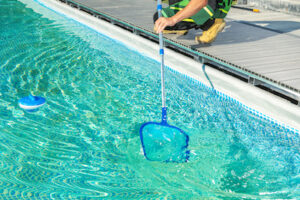9 Practical Tips to Keep Your Pool Clean and Healthy
A sparkling and appealing swimming pool represents luxury and leisure, but maintaining its cleanliness and ensuring its water is safe may be difficult. Regular pool upkeep is critical not just for aesthetic reasons but also for the health and safety of swimmers.
A well-kept pool has a friendly and attractive aura, producing a calm environment for swimmers. People are more likely to appreciate spending time in a crystal clear and welcoming collection. It improves the property’s overall visual appeal, enhancing value and attractiveness.

Maintaining a clean pool is also essential for the health and safety of swimmers. When stagnant water is not adequately supported, it provides a breeding ground for dangerous bacteria, algae, and other diseases. These pollutants can cause skin rashes, ear infections, and even more severe ailments like gastroenteritis.
Regular pool care not only maintains the water free of hazardous germs but also helps balance the pool’s chemical levels, guaranteeing that swimming is safe. It aids in the prevention of debris, calcium deposits, and algae growth, which may harm pool surfaces, filters, and circulation systems. It increases the pool’s infrastructure’s lifetime. You may prevent costly repairs and extend the life of your pool by investing in pool cleanliness, saving both time and money in the long run.
Aside from health and safety, a clean pool encourages an active and healthy lifestyle by encouraging people to swim and do water-based workouts regularly. It is a focal point for socializing and entertainment, drawing friends and family together for bonding, pleasure, and producing memorable memories.
This post will review valuable suggestions and approaches for keeping your pool clean and healthy. By following these instructions, you can keep your pool in top shape all year, giving a beautiful hideaway for anyone to enjoy.
1. Proper Pool Cover Usage
A pool cover is an excellent method to keep it clean when not in use. A pool cover keeps trash out of the water, reducing the stress on your filtration system and extending the time between cleanings. It not only keeps the pool clean, but it also helps to retain heat, lowering energy expenses and evaporation. It also aids in the retention of chemicals, minimizing the need for routine maintenance and water treatment. Invest in a high-quality pool cover that fits well and is easy to manage, making it comfortable to use frequently. Remove any standing water from the cover while using it to keep it from leaking into the pool.
2. Regular Skimming and Cleaning
Regular skimming and cleaning are essential to keep your pool clean. Leaves, insects, and other debris can build on the water’s surface, making it dirty and providing a breeding habitat for germs. To eliminate these impurities, use a leaf net or skimmer to regularly skim the pool’s surface. It is critical to develop a program for skimming, especially during seasons when there is an increased input of trash, such as autumn.
It would be best to clean your pool’s walls and floor using a pool brush and vacuum to prevent algae and germs at bay and keep the pool looking great. Consider investing in a robotic pool cleaner for more efficient and automatic cleaning.
3. Proper Filtration System
Clogged filters can obstruct efficient water circulation and diminish the efficiency of chemical treatments. Thus, they should be cleaned regularly. A properly working filtration system is the foundation of a clean and healthy pool. The filtration system eliminates debris, dirt, and toxins from the water, preventing algae and bacteria from growing. It is critical to select the appropriate kind and size of filter based on the volume and usage of the pool. Inspect and clean the filter regularly since collected debris might limit performance.
4. Balancing Chemical Levels
Proper water chemistry is essential for a healthy swimming pool. To do so, you must regularly test for the pH, calcium hardness, chlorine, and alkalinity of the water. Testing of the water can be done using a reliable testing kit, pool maintenance products, test strips or a water testing kit. The pH should be between 7.2 and 7.6, and the chlorine levels should be between 1 and 3 ppm (parts per million). To regulate the pH, keep alkalinity between 80 and 120 ppm and calcium hardness between 150 and 250 ppm. Imbalanced water chemistry can cause skin and eye irritation and diminish chlorine efficiency, leaving your pool prone to germs and algae.
Additionally, check that alternative sanitizers are required to kill hazardous germs and prevent algae formation.
5. Shock Treatment
Even with sufficient filtration and chemical balance, pollutants can build in pool water over time. A shock treatment is required to remove accumulated germs and organic waste. Shocking the pool implies briefly boosting the chlorine levels to break out impurities. It is advised to shock your reservoir every 1-2 weeks or after heavy rains, excessive pool usage, or when you observe hazy water. Follow the manufacturer’s instructions and avoid swimming until the chlorine levels recover to acceptable levels.
6. Monitor the Water Level
Monitoring the water level in your pool is an often ignored but critical element of pool upkeep. Evaporation, splashing, and intense rainfall can cause water levels to vary. Maintaining the proper water level is crucial for effectively operating the pool’s filtration system and minimizing potential pump damage. If the water level goes below the skimmer intake, the pump may pull in air, resulting in reduced circulation and possible pump failure. On the other hand, excessive water levels might cause ineffective skimming and even harm the pool’s infrastructure. Regularly check the water level to ensure it is within the acceptable range, typically halfway up the pool’s skimmer entrance.
7. Regular Backwashing
Backwashing is essential in pool care, particularly for sand or DE filters. The filter gathers dirt, debris, and trapped particles over time, lowering efficiency. Backwashing is required regularly to clear out these pollutants and ensure adequate water flow. Backwashing should be done once every 1-2 weeks or when the pressure gauge on the filter shows an increase of 8-10 psi over the regular operating level. It avoids clogs and keeps the pool water clean and healthy. Excessive backwashing could result in wasteful water waste. Maintaining a clean filter while saving water is critical, especially in locations where water is scarce, or consumption laws are severe.
8. Professional Pool Maintenance
While you can perform many maintenance activities independently, hiring professional pool maintenance services can give additional benefits. Professional pool technicians have the knowledge and experience to diagnose and handle complicated issues efficiently. They may do complete inspections, clean hard-to-reach locations, and offer professional advice on pool maintenance. Regular expert maintenance keeps your pool in great shape all year and helps discover any problems before they become serious. Professional services may also manage pool openings and closings for the season, assuring proper winterization and minimizing damage from freezing conditions.

9. Regular Inspection of Pool Equipment
All pool equipment must be inspected regularly to ensure a clean and healthy pool. Check the pool’s pump, filter, and other mechanical components to ensure they work correctly. Look for evidence of wear, leaks, or strange noises, which might signal a problem. Early discovery of equipment faults can help to avoid additional damage and costly repairs. In addition, evaluate the pool surface and surrounding area for any evidence of deterioration or dangers that might endanger swimmers’ safety. Resolve any concerns as soon as possible to maintain a safe and pleasurable pool environment.
Conclusion
A clean and healthy pool is necessary for various reasons, including health, safety, aesthetics, and lifespan. You may ensure a clean and attractive pool environment for numerous hours of fun and relaxation by following the guidelines above.
